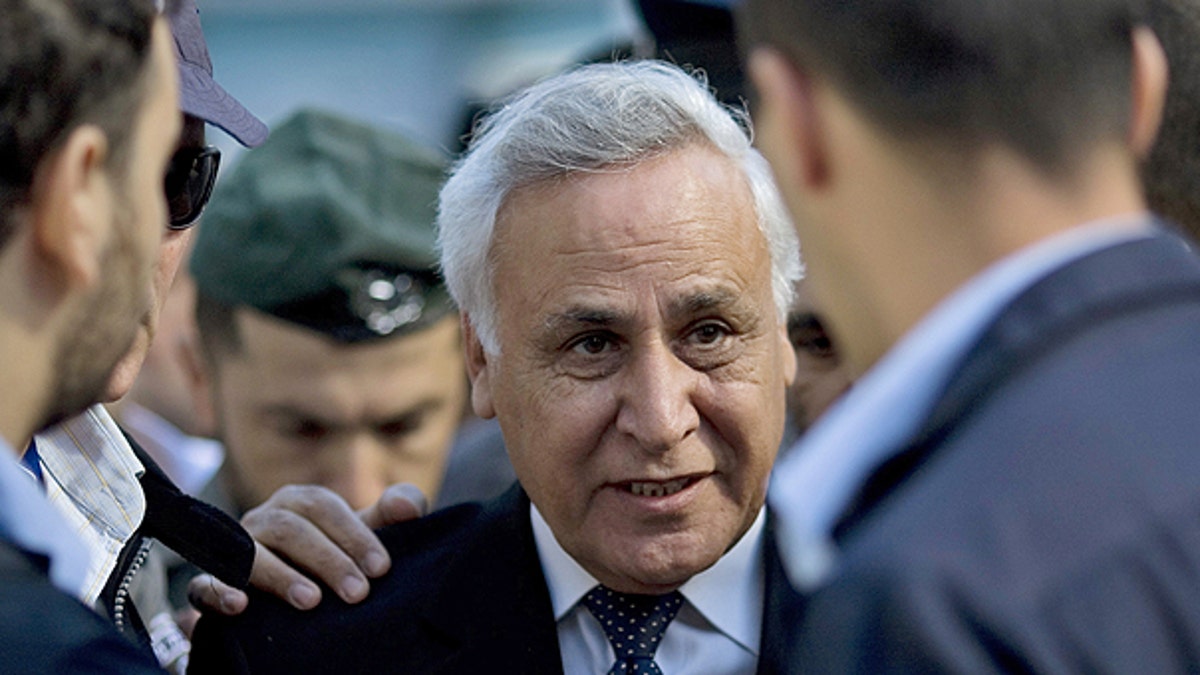
March 22: Former Israeli President Moshe Katsav, center, arrives at a court in Tel Aviv. (AP)
TEL AVIV, Israel – An Israeli court ordered former Israeli President Moshe Katsav to prison for seven years Tuesday following a rape conviction, rejecting his attorneys' request for leniency and making him the highest-ranking Israeli official ever sentenced to jail.
The silver-haired Katsav remained stoic throughout most of the reading, but he broke down in tears upon hearing his sentence and screamed at the judges: "You made a mistake! It is a lie! The girls know it is a lie!"
As he exited the courtroom, two of his grown sons scuffled with security guards. "I saw you! You hurt my boy!" Katsav screamed. His lawyers vowed to appeal.
In December, the Tel Aviv District Court convicted Katsav, 65, of raping a former employee and sexually harassing two other women who used to work for him. He also was convicted of indecent acts and obstruction of justice. The rape took place before Katsav became president in 2000, while other crimes occurred after he took office.
The three-judge panel, which ruled 2-1, said Katsav's record of public service would not be weighed in his favor, accusing him instead of exploiting his position to become a sexual offender. The court ordered him to report to prison on May 8, giving him time to prepare an appeal. He must also pay fines of about $25,000 and $7,000 to two of his victims.
"The defendant committed the acts like any other person, and he must bear the punishment like any other person," Judge George Kara read from a prepared verdict. "The message leaving this courtroom has to be sharp and clear."
Tuesday's sentencing capped a dramatic fall from grace for a man who rose from humble beginnings to become a symbol of success for Mizrahi Jews, or those of Middle Eastern descent, who for years were an underclass in Israel. The presidency is a largely ceremonial office, typically filled by a respected elder statesman who is capable of rising above politics and unifying the country.
The case has also been seen as a victory for the Israeli legal system and for women's rights in a decades-long struggle to chip away at the nation's macho culture, which once permitted political and military leaders great liberties. Outside the building, a group of women held signs with a message directed toward female victims of sex crimes, "You're not alone."
The case began nearly five years ago when Katsav suddenly complained that a female employee was trying to extort him. She went to police with her side of the story, and other women came forward with similar complaints of sexual assaults.
Katsav, Israel's eighth president, resigned under public pressure two weeks before his term was to end in 2007. The current president, Nobel winner Shimon Peres, succeeded him.
Katsav repeatedly denied all allegations against him, claiming he was a victim of a political witch hunt and suggesting he was targeted because of his ethnicity. Katsav was born in Iran and immigrated to Israel as a child.
The Israeli public has been riveted by the case's twists and salacious details.
In one memorably bizarre press conference Katsav lashed out angrily at prosecutors and the media for plotting his demise, shaking in anger, waving a computer disk that he said proved his innocence and screaming. Later, he rejected a plea bargain that would have allowed him to avoid jail time.
In December, the Tel Aviv court ruled that Katsav twice raped a woman who worked for him when he served as tourism minister in the 1990s, and assaulted and harassed two other women who worked for him when he was president, from 2000 to 2007. The scathing ruling called him "manipulative" and said his testimony was riddled with lies.
The conviction brought nearly unanimous scorn for Katsav and widespread praise for a legal system that proved itself egalitarian by bringing him to justice. Katsav's supporters, mostly people from his hometown of Kiryat Malachi, have demanded an explanation about why the court chose his victims' versions of events over the former president's.
At Tuesday's sentencing, Kara said Katsav's acts harmed the public's trust in its officials and carried moral turpitude. He acknowledged that the spectacle of a former president going off to jail would be difficult, but necessary to prove that no individual is above the law.
"We can't forget that the accused is not a victim but a victimizer," he said.
Katsav's attorneys have argued that their client did not receive a fair trial because of a hostile climate created by the media. In a minority opinion, Yehudit Shevach said these circumstances and the pain caused to the Katsav family influenced her to recommend a lesser sentence of four years behind bars.
Throughout the reading, the calls of protesters outside the courtroom were heard clearly inside.
A stone-faced Katsav entered the courtroom accompanied by his sons and confidantes and would not address the media. Neither his wife Gila nor his three accusers were present.
He refused to sit in the dock until the cameras left and then erupted in anger upon hearing his sentence.
"Just because someone is quiet doesn't mean he is guilty," he cried. "It's all lies. You have committed a great injustice."
Katsav's attorney, Zion Amir, said the court trampled his client's rights.
"There are those who think the sentencing is a celebration of democracy in Israel. I think it is a sad day, a day of mourning," he said.
Prime Minister Benjamin Netanyahu and opposition leader Tzipi Livni each issued statements expressing sorrow for Katsav's fate but respect for the sentencing.
